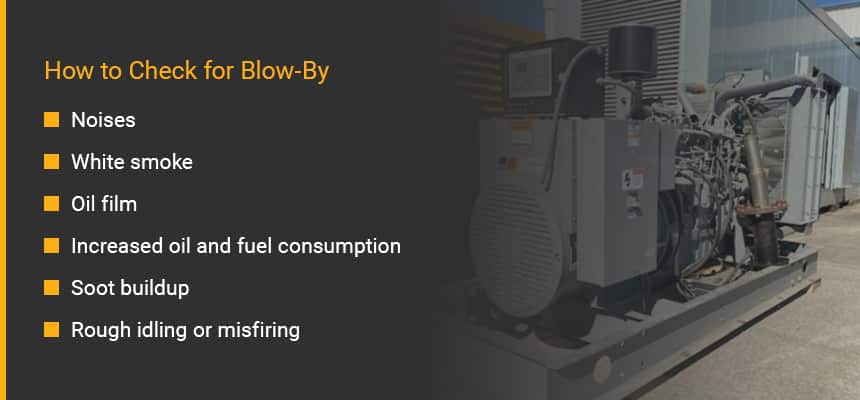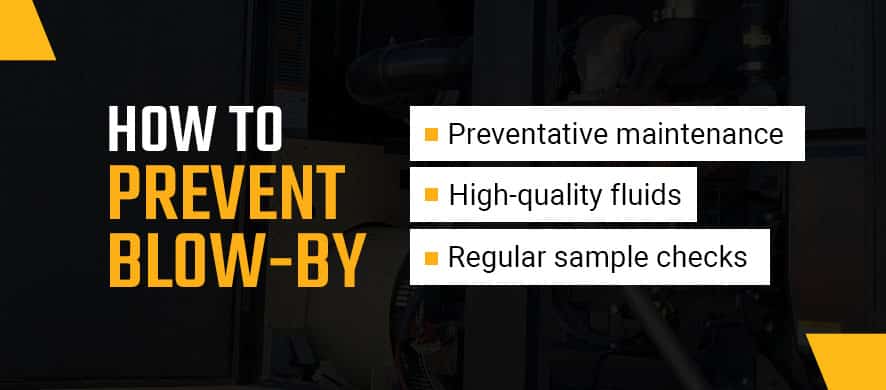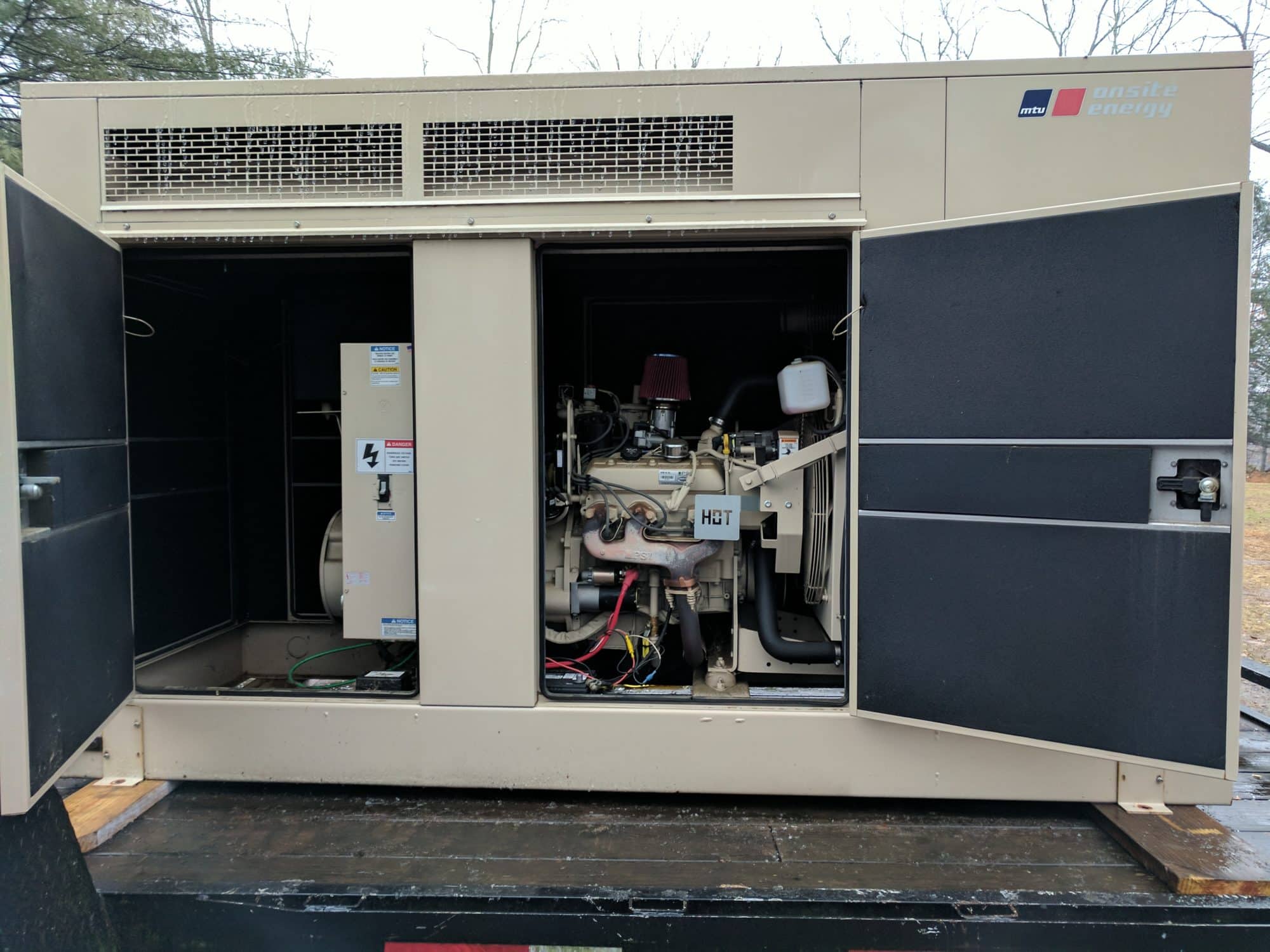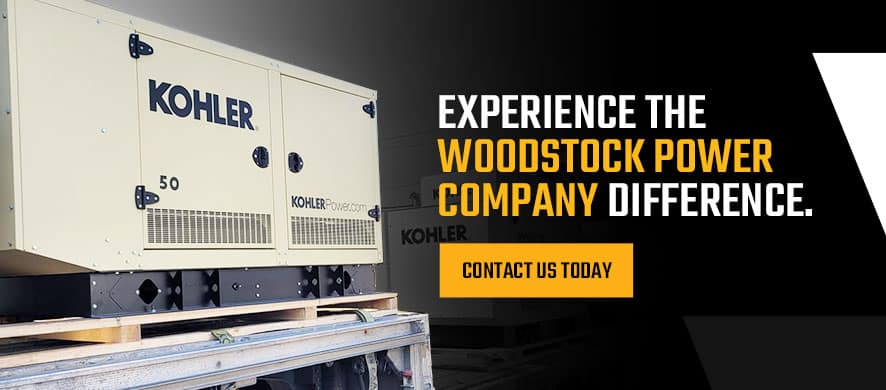Engine Blow-by: What It Is, Causes, and How to Fix It
What Is Engine Blow-By?
Engine blow-by can affect all diesel engines, including the ones in your commercial generators. Knowing the signs and symptoms of blow-by can help you avoid this issue in the future. When you stay on top of blow-by and practice good generator maintenance, you can potentially reduce downtime, save money and protect your investments.
What Is Blow-By on a Diesel Engine?
Engine blow-by is when a mixture of air-fuel or combustion gases leaks between the engine’s pistons and cylinder wall into the crankcase. Engine blow-by can occur within both diesel and gas engines. Piston ring wear or other component issues can lead to combustion gases leaking into the crankcase, often creating visible excess gas release from your generator. If you spot blow-by, you’ll need to get your generator looked at to avoid poor efficiency and possibly irreparable engine damage.
You’ve probably seen or heard blow-by on the road as you’ve gone past a car or bus that has these signs. The same issues that happen to those cars or buses can happen with your generator engine.
How Much Blow-By Is Normal?
All engines have minor levels of blow-by, as piston rings aren’t completely watertight, even in new engines. For instance, a 12-liter engine in good condition may experience 1.5 cubic feet per minute (cfm) of blow-by under normal operating temperatures. That number increases to 3.5 cfm under colder temperatures. Excessive blow-by is a sign of larger issues you’ll need to address before resuming operations.
What causes an engine to blow?
Blow-by happens when the internal combustion that occurs in your engine’s combustion chamber forces contaminants such as air, fuel and moisture past the piston rings and into the crankcase. If your engine’s piston rings don’t have a good fit or aren’t well-sealed, they cannot contain the pressure produced from the combustion and will instead leak air-fuel mixture and contaminants.
Over time, as the engine’s pistons move up and down against the cylinders during normal engine operations, both parts wear away. The cylinders become wider, while the pistons become smaller. The piston rings also wear away, making them less capable of maintaining a firm seal. As all the parts continue to grind against each other, these issues become more exaggerated, and the amount of blow-by can increase.
Additionally, any soot and deposits left over from incomplete combustion will collect on the rings, interfere with their seal and can further worsen engine blow-by.
Blow-by can also be caused by:
- Bad, broken or improperly fitting piston rings
- Piston damages or defects
- Gaps or spaces between the piston rings
All of these issues create space where air and fluids from the engine can reach the crankcase and decrease engine compression.
How to Check Blow-By on a Diesel Engine
Your generator’s engine can give several signs of blow-by that you should be on the lookout for. Knowing what to watch out for can help you catch problems early, avoiding expensive repairs and downtime. The earlier you spot a blow-by issue, the faster you can get everything working efficiently once again. Here’s how to test for blow-by in your diesel engine:
- Noises: Loud or sputtering noises coming from the engine, possibly accompanied by exhaust clouds or vented fumes, are signs of blow-by.
- White smoke: One of the most obvious signs of excessive blow-by is white smoke coming from the oil-fill tube or a valve cover.
- Oil film: Another telltale sign is a layer of oil film around the tube, as blow-by causes unburned fuel to contaminate the oil and leak into the crankcase.
- Increased oil and fuel consumption: If you’re noticing your generator is using more oil or fuel than normal, this could be a sign that much of it is leaking into the crankcase and causing blow-by.
- Soot buildup: Blow-by contributes to increased incomplete combustion, which produces soot that’s retained within the cylinder walls.
- Rough idling or misfiring: If your generator is difficult to start or keep running, blow-by might be the culprit, as blow-by affects important engine processes.

How Does Blow-By Affect Engines?
Blow-by inhibits overall engine performance due to a loss of compression. Diesel engines operate by compression ignition. They convert fuel to energy by pressurizing the cylinder, which creates heat and ignites diesel fuel. Blow-by can lead to several problems with engine performance, reducing efficiency and causing damage. Blow-by can lead to:
- Poor performance: When the cylinder has leaks, it can’t contain as much pressure, leading to misfiring and poor engine performance. Additionally, when gases expand and slip past the piston rings, they cannot effectively push the piston down to make the engine produce sufficient output during the power stroke, resulting in a drop in horsepower.
- Damaged parts: Blow-by also coats parts of the intake with oil and fuel. After wear and degradation of piston rings and cylinder walls, more air, fuel and moisture can slip into the crankcase and damage the parts.
- Loud noises: Engines experiencing blow-by will also produce a much louder noise than normal and force polluting exhaust fumes out of the engine vents.
- Increased fuel consumption: Blow-by will also result in increased fuel consumption. If moisture, fuel or air get into the crankcase, they can contaminate the generator’s oil. If there are any remnants of gases or particulates left behind in your engine’s compression chamber, these contaminants may slip into the crankcase. From there, they can seep into the engine and cause extensive damage.
Simply stated, engine blow-by can decrease your engine’s overall efficiency and performance, result in costly and time-intensive repairs or cause irreparable damage.
How Long Will an Engine Last With Blow-By?
While we highly recommend that you do not operate a backup generator that is experiencing blow-by, your generator can possibly continue running with blow-by, but you’ll need to get it looked at and addressed quickly. Engine blow-by will accelerate wear and tear on your generator engine and can create a potentially hazardous environment when operating. You’ll start to see reduced efficiency and performance — your generator will consume more fuel, perform less effectively and see more damage. In many cases, the generator may cease to operate entirely.
If you see excessive blow-by, contact a professional immediately. They’ll come in and see what’s causing the blow-by, giving you solutions and helping to protect your generator from damage. Avoid continuously running a generator with excessive blow-by for long periods to keep your generator and facility safe.
How to Prevent Blow-By
Whether you’ve already discovered blow-by in your diesel generator engine or are looking to avoid this issue altogether, engines without blow-by are crucial for the continued success of your business. Preventing blow-by is easier and often less expensive than repairing extensive damage. Watch out for the signs of blow-by and take preventative action to help save your operation time and money.
Some of the best ways to prevent blow-by include:

- Preventative maintenance: Proper engine maintenance is key to reducing the chances of engine blow-by. Frequently changing the engine’s oil will help remove any solid carbon buildup, which is known to erode metals. Adding treatments and detergents to the fuel and oil will help dissolve solids and buildup into liquid form so they’re easier to remove.
- High-quality fluids: Using high-quality oils and fuels will also keep the engine running longer and will ensure combustion occurs correctly. Proper engine fluids will prevent the creation of solid byproducts like hydrocarbon combustion solids, which wear away metal.
- Regular sample checks: In addition, you should regularly collect and send oil samples to a professional to have the oil checked for any foreign particulates and residue. Oil analysis can help inform you of any degradation occurring within the engine.
How to Fix Blow-By
If your engine is experiencing blow-by symptoms, major fixes may be necessary. Prioritize working on the affected engine, as blow-by issues can increase the longer they continue. If you’re unfamiliar with generator engines, contact a professional for assistance. They’ll expertly go over your engine, ensuring your generator runs smoothly once again.
Here’s an overview of how to deal with generator blow-by:
- Inspect your generator: Check your generator to make sure it’s got excessive blow-by. Look for increased oil consumption, excessive exhaust smoke or power loss. Find the point where the problem is coming from.
- Check piston rings: Next, clean or replace the piston rings. Piston rings are often the main cause of blow-by — addressing any piston ring issues first should help you see improvement.
- Clean parts: Then, clean or resurface the engine block cylinder walls. Dirt accumulates in the cylinder or on gaskets, which can create scratches on the cylinder walls and gasket surfaces. These scratches compromise seals on your gaskets, piston rings and cylinder walls, leading to blow-by. Clean out your engine components and check them for wear, replacing scratched and damaged parts as needed.
- Replace components: If nothing else works, you might need to replace the engine or the generator. If the blow-by damage is excessive or the problem is too big, it will be difficult to fix and expensive to correct. Sometimes, it’s easier to start fresh with a new engine or generator to get your operation back on track.
If you think your generator engine might be experiencing blow-by, or if you’re looking for a new, used, replacement or rental generator, please reach out to us at Woodstock Power Company!
The Woodstock Power Company Experience
Woodstock Power Company’s industry experts focus on commercial power generator sets, with in-depth knowledge to help you choose the right commercial or industrial generator for your needs. If you’re dealing with engine blow-by or other generator issues, we’re ready to help. We offer a wide selection of generator sets, allowing you to get the model that best fits your needs.
Our experts are ready to assist you, from answering your questions about power generator sets to helping you find the best selection in our inventory based on:
- Peak and average power requirements
- Fuel preference for natural gas or diesel
- Portability and stationary power
- Prime and standby generator requirements
- Available space and exhaust restrictions
Our experts can also help coach you on prime, continuous and standby power generators and teach you how to find the best surplus, new or used generator for your application.
At Woodstock Power Company, we strive to deliver unmatched customer service and products to our clients. We carry only the most top-rated power generator sets, providing you with generators that will fit your budget and give you great value. We thoroughly inspect, service and verify all of our equipment, ensuring you get a quality machine you can rely on. We make all necessary repairs or modifications to our used generators to make them compliant with industry standards, and we fully test each generator before we sell it.
From selling new and used generators to renting and buying, Woodstock Power Company is your go-to for all things generator. We buy used generators in good condition, so if you’ve already upgraded and are looking to sell your older model, get in touch with our sales team! Our buying process makes trading in your old stock and upgrading fast and simple, reducing your downtime.
Experience the Woodstock Power Company difference. Call us at 610-658-3242 or fill out our contact form to explore the quality products and services we provide.
Follow us on LinkedIn, YouTube, Facebook and Twitter for more information about commercial generators!



